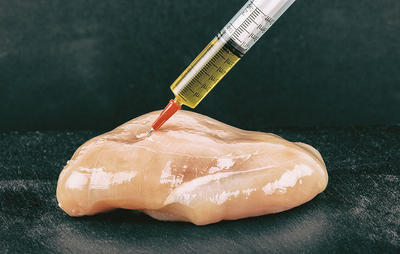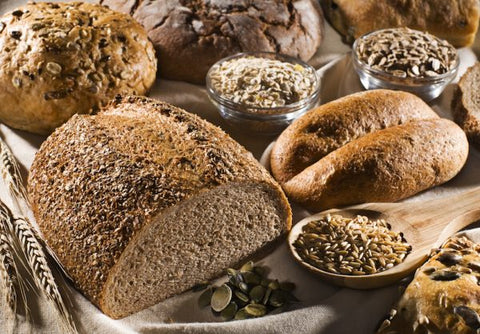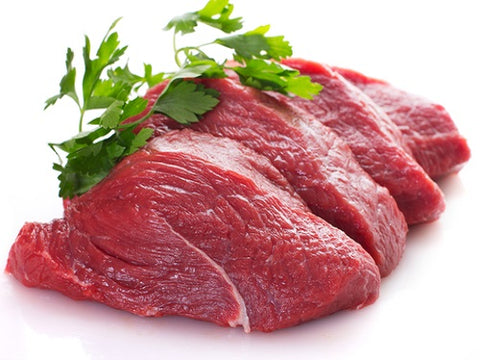Your Cart is Empty
Are You Unknowingly “Poisoning” Your Gut?

If you’ve read up on nutrition and weight-loss management, you’ll know that your gut health plays an integral role in determining whether you can get that “sexy” body you’ve always wanted…
Or if you are stuck with a stubborn “muffin-top” that just can’t seem to go away.
And a huge reason for this is due to the trillions of bacteria living in your digestive system at this very moment.
More and more research studies are highlighting that your gut bacteria could be influencing your metabolism and — even more alarmingly — affecting your weight.
One such microbe in your gut is Helicobacter pylori.
It’s one of the microbes that controls the stomach’s production of the hunger hormone ghrelin.
In an article for Fitness Magazine,Martin Blaser, M.D, a professor of medicine and microbiology at New York University & the author of the book, “Missing Microbes” says:
“When you wake up in the morning and you’re hungry, it’s because ghrelin is telling you to eat. When you eat breakfast, your level of ghrelin usually goes down… but if you don’t have Helicobacter in your system, it doesn’t”.
The result? You end up eating more.
Now, you’re probably wondering:
“What affects the production of microbes like Helicobacter pylori in my gut?”
In this day and age, antibiotics is one major reason for wreaking havoc on your gut bacteria.
I’m not talking about the antibiotics that your doctor prescribes you when you’re down with gastric flu…
I’m Referring To The Antibiotics That You Unknowingly Ingest From The Livestock Food You Eat.
In the last 20 years, the number of large-scale farms have risen dramatically… and these farms have started feeding antibiotics to their livestock to help the animals remain healthy — and more importantly — gain more weight.
The fatter the animal, the more meat they can get out of it, and of course, the more sales they can make to the large supermarket chains.
And when you eat these meat, you are ingesting the antibiotic strains as well… which is one of the major factors that wreak havoc on your gut bacterial balance.
A study done by Dethlefsen and Relman (2011) published in the US National Library of Medicine found that antibiotics can disrupt up to 30% of the bacteria in your gut… causing rapid and significant drops in richness, diversity and evenness.
Simply put:
Antibiotics kill off several strains of bacteria in your gut that actually helps your body regulate multiple operations like metabolism and your immune system.
This can manifest in a variety of problems for Americans who unknowingly ingest antibiotics via the livestock meat they consume.

Gut Bacteria Imbalance Problem #1: Increased Susceptibility To Infections
One of the most pressing threats of the sudden alternation to gut bacteria composition due to antibiotics is the increased susceptibility to intestinal infections.
Antibiotic-associated diarrheas (AAD) are a frequent occurrence.
A study done by Lawley & Buffie (2012) involving giving multiple doses of antibiotics to a mouse has provided evidence that the substantial losses of bacteria diversity caused by antibiotics in the small and large intestinal can result in the establishment of a chronic infection with C. difficile — a symptomatic infection in the colon that causes watery diarrheas, fever, nausea and abdominal pain.
Gut Bacteria Imbalance Problem #2: Deregulated Metabolism
Fact:
More and more studies have established that gut bacteria is an important factor in the regulation of our metabolism.
And as you have learnt earlier, antibiotics ingested via medicine or the livestock food we consume actually messes up our gut bacterial balance…
Which researchers have now found leads to deregulation of our metabolism — which in turn gives rise to obesity.
Recent work by Dr Thuny and his team (2012) has shown long-term exposure to antibiotics is associated with increased body mass index in humans.
Even more alarmingly, a study done by Dr Cho and her team (2012) discovered that early antibiotic exposure can cause obesity even with normal dietary intake.
If you are currently controlling your diet and avoiding all the sugary, fatty foods — and yet, just can’t seem to shed off the unwanted flabs around your tummy, hips and thighs…
Your gut bacterial balance may very well be disrupted due to unknowing ingestion of antibiotics via the livestock foods (e.g chicken, beef etc.) you’re consuming.
How Can You “Save” Your Gut And Start Restoring The Optimal Bacterial Balance?
Justin Sonnenburg, Ph.D, an assistant professor of microbiology and immunology at Stanford University — in an interview with Fitness Magazine— suggests:
1. Eat More Fiber
Eat a whole lot more fruits, vegetables and whole grains such as oatmeal, brown rice, whole-wheat bread.

These foods supply prebiotics to your body — a kind of fiber that the bacteria in your gut thrives on. This helps your gut bacteria to reproduce quicker — so even if the antibiotics you ingest kill off some of them… there will still be plenty of “good” gut bacteria that remain to regulate your immune system & metabolism.
2. Stop Snacking On Sugary Foods & Switch To Healthier Alternatives
This may seem pretty obvious… but what many people don’t realise is that your gut bacteria require complex carbohydrates (like legumes and whole grains) to thrive.
Dr Sonnenburg explains that when you get too many calories from sweets, you’re starving your gut bacteria.
So they either die (which is bad for your gut bacterial balance) or even worse, they adapt by feeding on the mucus on the walls of your intestine which could contribute to low-level inflammation — a condition linked to obesity.
The solution?
Swap out the sweet stuff for “gut-bacteria-friendly” snacks like yoghurt, granola bars and baby carrots.

You’d be surprised at the difference it makes for your overall health as well as helping you shed those excess pounds.
3. Control Your Consumption Of Livestock Foods Such As Chicken And Beef
Since livestock foods is a prominent source of antibiotics, it only makes sense for you to regulate your intake of such foods.
You don’t have to avoid it — it is perfectly fine to consume these foods in moderation.

As long as you balance your diet with the two to three servings of fiber foods such as fruits and vegetables per day… your gut bacterial balance should be more or less in optimal condition.
Finally, Consume Probiotics To Restore Gut Bacterial Balance In The Fastest Way Possible
WebMD’s definition of probiotics is “… live bacteria that are good for your health, especially your digestive system. They help to keep your gut healthy”
When you consume probiotics, you are “installing” more strains of “pro-gut” bacteria into your gut which helps regulate your immune system — and more importantly — your metabolism.
And when your metabolism is in check, that’s when you can finally get rid of that dreaded “muffin top” and achieve that “sexy” body you’ve always wanted.
However, there are SPECIFIC strains of probiotics that can give you the maximum results in the shortest time… while others are more slow-acting and do not promote the significant weight loss you desire.
In fact, there’s a recent groundbreaking study that has found a strain of probiotics that’s proven to eliminate the “stubborn” fat within a matter of weeks.
Click Here To Read all About It
References:
1. Antibiotic treatment of clostridium difficile carrier mice triggers a supershedder state, spore-mediated transmission, and severe disease in immunocompromised hosts.
Lawley TD, Clare S, Walker AW, Goulding D, Stabler RA, Croucher N, Mastroeni P, Scott P, Raisen C, Mottram L, Fairweather NF, Wren BW, Parkhill J, Dougan G
Infect Immun. 2009 Sep; 77(9):3661-9
2. Vancomycin treatment of infective endocarditis is linked with recently acquired obesity.
Thuny F, Richet H, Casalta JP, Angelakis E, Habib G, Raoult D
PLoS One. 2010 Feb 10; 5(2):e9074.
3. Fitness Magazine Interview with Martin Blaser, M.D & Justin Sonnenburg, Ph.D: https://www.fitnessmagazine.com/weight-loss/tips/advice/gut-bacteria/
4. Antibiotics in early life alter the murine colonic microbiome and adiposity.
Cho I, Yamanishi S, Cox L, Methé BA, Zavadil J, Li K, Gao Z, Mahana D, Raju K, Teitler I, Li H, Alekseyenko AV, Blaser MJ
Nature. 2012 Aug 30; 488(7413):621-6.
5. The pervasive effects of an antibiotic on the human gut microbiota, as revealed by deep 16S rRNA sequencing.
Dethlefsen L, Huse S, Sogin ML, Relman DA
PLoS Biol. 2008 Nov 18; 6(11):e280.
